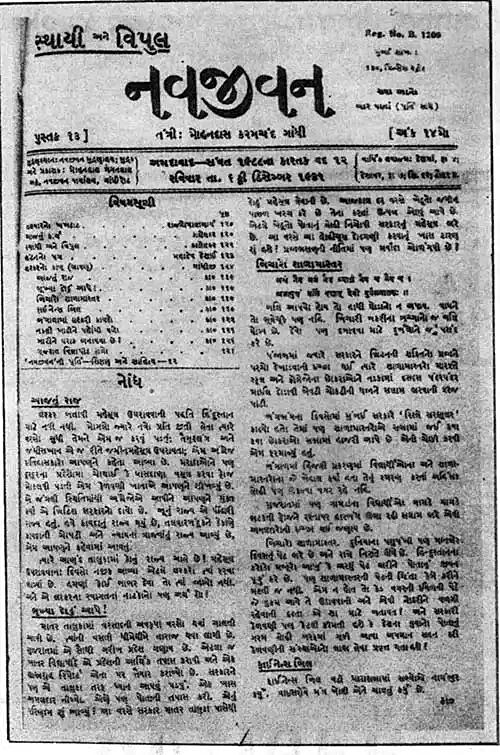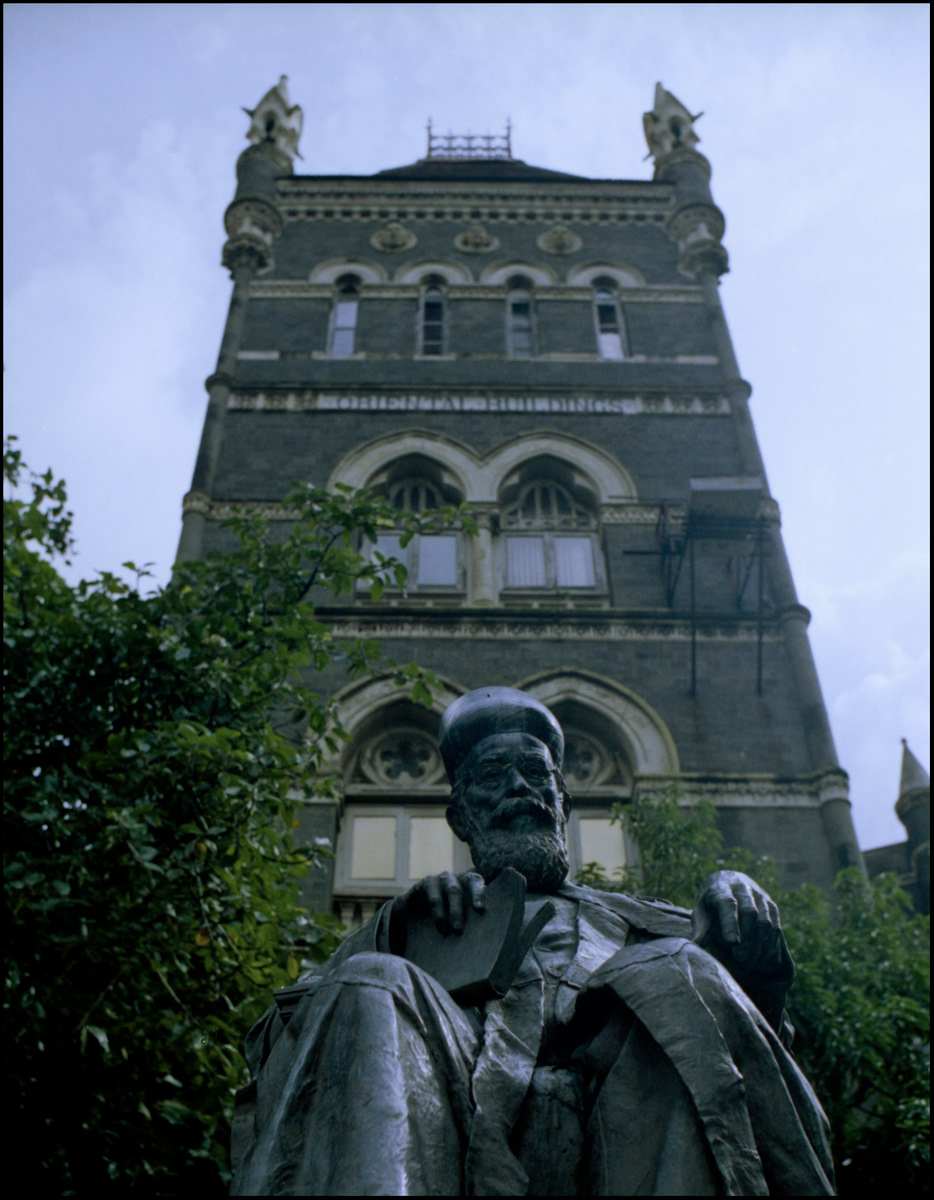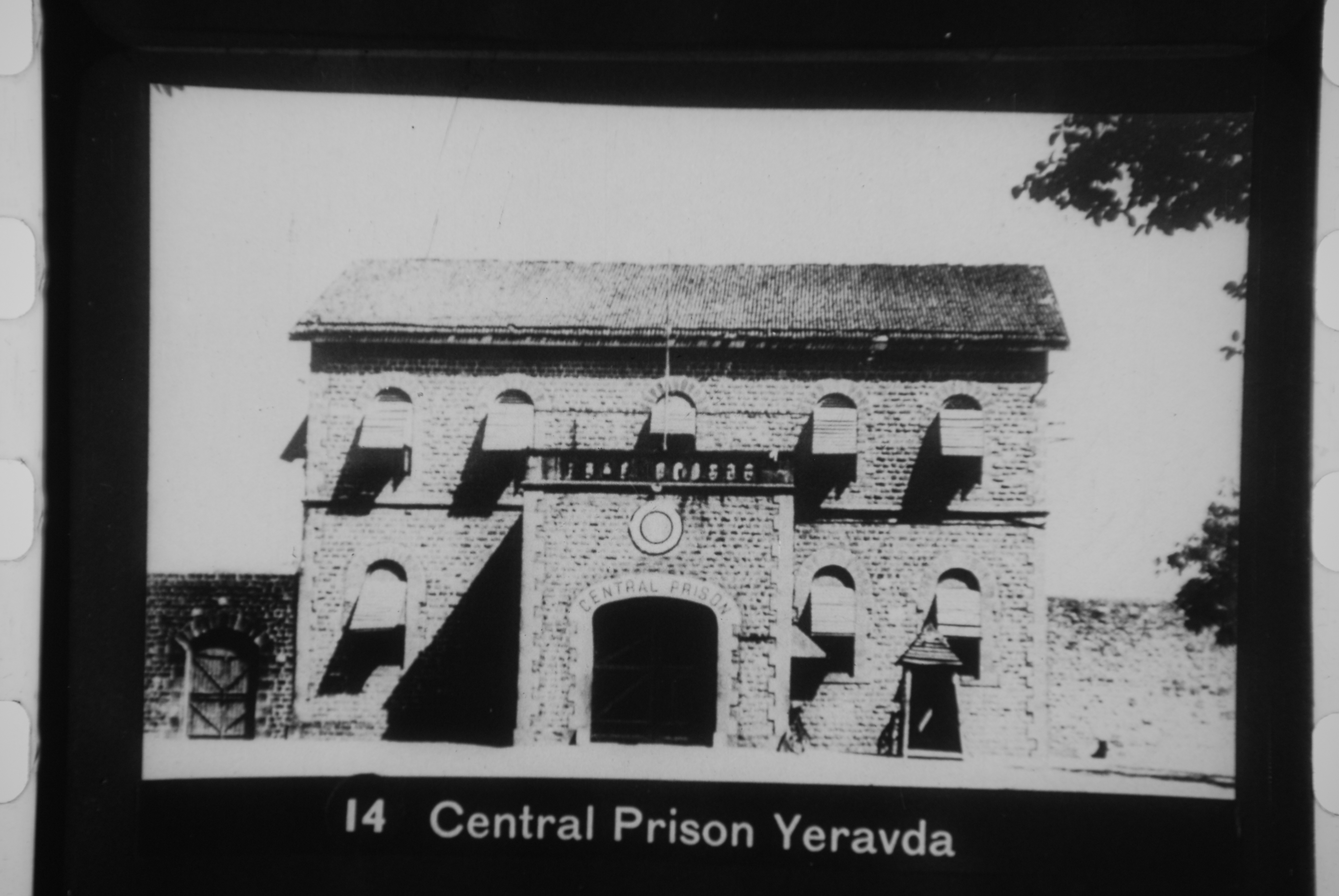|
Nagindas Parekh
Nagindas Narandas Parekh (8 August 1903 – 19 January 1993) was a Gujarati language critic, editor and translator from India. He is also known by his pen name, Granthkeet (literally, bookworm). Life Nagindas Parekh was born on 8 August 1903 in the city of Bulsar (now Valsad), Bombay Presidency, British India. He completed his primary and secondary education in Valsad and graduated from Gujarat Vidyapith university in 1921. From 1921 to 1925, he attended Gujarat College run by the Gujarat Vidyapith where he obtained a degree in Gujarati under Ramnarayan V. Pathak and in Bengali under Indrabhushan Majmudar. Subsequently, he joined Viswa-Bharati at Santiniketan in 1925–26 for higher studies in Bengali. He studied Bengali and the literature of Rabindranath Tagore under Kshitimohan Sen, and then he taught briefly at Gujarat Vidyapith in 1926. He worked with the Navajivan Trust from 1944 to 1947, and later, he taught at B J Vidyabhavan run by the Gujarat Vidhya Sabha. He worked ... [...More Info...] [...Related Items...] OR: [Wikipedia] [Google] [Baidu] |
Valsad
Valsad (Pronunciation: �alsɑɖ (Gujarati: વલસાડ), historically known as Bulsar, is a city and a municipality in Valsad district of the Indian state of Gujarat. It is the district headquarters of Valsad district. The city of Valsad is located in the south of Navsari and Surat. Etymology The name "Valsad" derives from ''vad-saal'', a Gujarati language compound meaning "covered (''saal'') by banyan trees (''vad'')" (the area was naturally rich in banyan trees). During British Raj, it was historically known as "Bulsar". Geography Valsad is located at . It has an average elevation of 13 metres (42 feet). The old city is about 4 km inland from the Arabian sea. Climate Valsad has a tropical savanna climate (Aw) with little to no rainfall from October to May and very heavy to extremely heavy rainfall from June to September when it is under the direct influence of the Arabian Sea branch of the South-west monsoon. Demographics As of the 2011 Ind ... [...More Info...] [...Related Items...] OR: [Wikipedia] [Google] [Baidu] |
Navajivan Trust
''Navajivan Trust'' is a publishing house based in Ahmedabad, India. It was founded by Mahatma Gandhi in 1929 and has published more than 800 titles in , , and other languages to date. Earlier, ''Navajivan'' referred to a weekly newspaper published by Gandhi, in , from 1919 (September 7) to 1931, from Ahmedabad. Object ...
|
Dilipkumar Roy
Dilip Kumar Roy (22 January 1897 – 6 January 1980), also spelt Dilipkumar Roy, was an Indian musician, singer, musicologist, novelist, poet, essayist and yogi. He was the son of Dwijendralal Ray (or Roy). In 1965, the Sangeet Natak Akademi, India's National Academy for Music, Dance and Drama, awarded him its highest honour for lifetime achievement, the Sangeet Natak Akademi Fellowship. Background and education Son of Dwijendralal Ray (1863–1913), the Bengali poet, playwright, and composer, Roy and his younger sister Maya lost their mother Surabala Devi in 1903. On his paternal grandmother's side, the family descended from Vaishnava ascetic Advaita Acharya, one of the apostles of the medieval Bengali saint Shri Chaitanya. His mother Surabala Devi was the daughter of distinguished homeopath physician Pratap Chandra Majumdar. Since his childhood, Roy had a fascination for Sanskrit, English, chemistry and mathematics. His passion for music stopped him from securing the highest ... [...More Info...] [...Related Items...] OR: [Wikipedia] [Google] [Baidu] |
Sarat Chandra Chattopadhyay
Sarat Chandra Chattopadhyay, alternatively spelt as Sarat Chandra Chatterjee ( bn, শরৎচন্দ্র চট্টোপাধ্যায়; 15 September 1876 or ৩১ শে ভাদ্র ১২৮৩ বঙ্গাব্দ – 16 January 1938), was a Bengali novelist and short story writer of the early 20th century. Most of his works deal with the lifestyle, tragedy and struggle of the village people and the contemporary social practices that prevailed in Bengal. He remains the most popular, translated, and adapted Indian author of all time. Early life Sarat Chandra Chattopadhyay was born on 15 September 1876 (৩১ শে ভাদ্র, ১২৮৩ বঙ্গাব্দ), in a Bengali Brahmin family in Debanandapur, a small village in Hooghly, West Bengal. Sarat Chandra spent most of his childhood at his maternal uncle's home in Bhagalpur, Bihar. Chandra spent his childhood in extreme poverty. Chandra was a daring, adventure-loving boy. His educa ... [...More Info...] [...Related Items...] OR: [Wikipedia] [Google] [Baidu] |
Indian Rebellion Of 1857
The Indian Rebellion of 1857 was a major uprising in India in 1857–58 against the rule of the British East India Company, which functioned as a sovereign power on behalf of the British Crown. The rebellion began on 10 May 1857 in the form of a mutiny of sepoys of the Company's army in the garrison town of Meerut, northeast of Delhi. It then erupted into other mutinies and civilian rebellions chiefly in the upper Gangetic plain and central India, though incidents of revolt also occurred farther north and east. The rebellion posed a considerable threat to British power in that region, and was contained only with the rebels' defeat in Gwalior on 20 June 1858., , and On 1 November 1858, the British granted amnesty to all rebels not involved in murder, though they did not declare the hostilities to have formally ended until 8 July 1859. Its name is contested, and it is variously described as the Sepoy Mutiny, the Indian Mutiny, the Great Rebellion, the Revolt of 1857, ... [...More Info...] [...Related Items...] OR: [Wikipedia] [Google] [Baidu] |
Dadabhai Naoroji
Dadabhai Naoroji (4 September 1825 – 30 June 1917) also known as the "Grand Old Man of India" and "Unofficial Ambassador of India", was an Indian political leader, merchant, scholar and writer who served as 2nd, 9th, and 22nd President of the Indian National Congress from 1886 to 1887, 1893 to 1894 and 1906 to 1907. He was a Liberal Party Member of Parliament in the British House of Commons, representing Finsbury Central between 1892 and 1895. He was the second person of Asian descent to be a British MP, the first being Anglo-Indian MP David Ochterlony Dyce Sombre, who was disenfranchised for corruption after nine months in office. His book ''Poverty and Un-British Rule in India'' brought attention to his theory of the Indian "wealth drain" into Britain. He was also a member of the Second International along with Kautsky and Plekhanov. In 2014, Deputy Prime Minister Nick Clegg inaugurated the Dadabhai Naoroji Awards for services to UK-India relations. India Post depicted ... [...More Info...] [...Related Items...] OR: [Wikipedia] [Google] [Baidu] |
Tansen
Tansen ( – 26 April 1589), also referred to and commonly known as Sangeet Samrat () , was a Hindustani classical musician. Born in a Hindu Gaur Brahmin family, he learnt and perfected his art in the northwest region of modern Madhya Pradesh. He began his career and spent most of his adult life in the court and patronage of the Hindu king of Rewa, Raja Ramchandra Singh (r.1555–1592), where Tansen's musical abilities and studies gained widespread fame. This reputation brought him to the attention of the Mughal Emperor Akbar, who sent messengers to Raja Ramchandra Singh, requesting Tansen to join the musicians at the Mughal court. Tansen did not want to go, but Raja Ramchandra Singh encouraged him to gain a wider audience, and sent him along with gifts to Akbar. In 1562, about the age of 60, the Vaishnava musician Tansen joined the Akbar's court, and his performances became a subject of many court historians. Numerous legends have been written about Tansen, mixing facts a ... [...More Info...] [...Related Items...] OR: [Wikipedia] [Google] [Baidu] |
Confucius
Confucius ( ; zh, s=, p=Kǒng Fūzǐ, "Master Kǒng"; or commonly zh, s=, p=Kǒngzǐ, labels=no; – ) was a Chinese philosopher and politician of the Spring and Autumn period who is traditionally considered the paragon of Chinese sages. Confucius's teachings and philosophy underpin East Asian culture and society, remaining influential across China and East Asia to this day. Confucius considered himself a transmitter for the values of earlier periods which he claimed had been abandoned in his time. His philosophical teachings, called Confucianism, emphasized personal and governmental morality, correctness of social relationships, justice, kindness, and sincerity. His followers competed with many other schools during the Hundred Schools of Thought era, only to be suppressed in favor of the Legalists during the Qin dynasty. After the collapse of Qin and the victory of Han over Chu, Confucius's thoughts received official sanction in the new government. During the Tan ... [...More Info...] [...Related Items...] OR: [Wikipedia] [Google] [Baidu] |
Gandhiji
Mohandas Karamchand Gandhi (; ; 2 October 1869 – 30 January 1948), popularly known as Mahatma Gandhi, was an Indian lawyer, anti-colonial nationalist Quote: "... marks Gandhi as a hybrid cosmopolitan figure who transformed ... anti-colonial nationalist politics in the twentieth-century in ways that neither indigenous nor westernized Indian nationalists could." and political ethicist Quote: "Gandhi staked his reputation as an original political thinker on this specific issue. Hitherto, violence had been used in the name of political rights, such as in street riots, regicide, or armed revolutions. Gandhi believes there is a better way of securing political rights, that of nonviolence, and that this new way marks an advance in political ethics." who employed nonviolent resistance to lead the successful campaign for India's independence from British rule, and to later inspire movements for civil rights and freedom across the world. The honorific ''Mahātmā'' (Sanskrit: ... [...More Info...] [...Related Items...] OR: [Wikipedia] [Google] [Baidu] |
Premanand Bhatt
Premanand Krushanram Bhatt (Gujarati: પ્રેમાનંદ કૃષ્ણંરામ ભટ્ટ) (1636–1714), also known as Premanand, was a medieval Gujarati poet and ''Maanbhatt'' (professional story teller) known for his Akhyana compositions. Life He was born in 1636 at Vadodara in the caste of the Nandora Chaturvanshi Brahmins. In colophons of his Akhyanas, he remarked such as, "Place of braves called Vadodara, Situated in the middle of Gujarat, caste Chaturvanshi Bramins, Bhatt Premanand is the name". In those times, Gujarat was ruled by Mughal governor Aurangzeb. At that time it was openly said: "Marwari language is valued at 16 aanas (equiv. to 1 Rupee), Kachhi language is valued at 12 aanas; Marathi language is valued at 8 aanas, while Gujarati language is valued at 4 paise (equiv. to 1 aana)". Born at the time when Gujarati language was devalued in such a manner, Premanand vowed that: "I shall not put on a Turban on my head till the time I earn a resp ... [...More Info...] [...Related Items...] OR: [Wikipedia] [Google] [Baidu] |
Mahadev Desai
Mahadev Haribhai Desai (1 January 1892 – 15 August 1942) was an Indian independence activist, scholar and writer best remembered as Mahatma Gandhi's personal secretary. He has variously been described as "Gandhi's Boswell, a Plato to Gandhi's Socrates, as well as an Ānanda to Gandhi's Buddha". Early life Mahadev Desai was born in an anavil brahmin family on 1 January 1892 in the village of Saras in Surat district of Gujarat to Haribhai Desai, a school teacher, and his wife Jamnabehn. Jamnabehn died when Desai was seven years old. In 1905, aged 13, Mahadev was married to Durgabehn. He was educated at the Surat High School and the Elphinstone College, Mumbai. Desai graduated with a BA Degree, and after earning his L.L.B in 1913 took a job as an inspector at the central co-operative bank in Bombay. Gandhi's associate Mahadev Desai first met Gandhi in 1915 when he went to meet him to seek his advice on how best to publish his book (a Gujrati translation of John Morley ... [...More Info...] [...Related Items...] OR: [Wikipedia] [Google] [Baidu] |
Navalram
Navalram Laxmiram Pandya (Gujarati: નવલરામ) (9 March 1836 – 7 August 1888) was a Gujarati critic, playwright, poet, essayist, editor, educationist and a social reformer. He is considered to be a most important figure in modern Gujarati literature. The first humourist, the first historical dramatist, the first critic and a leading scholar of his age, Navalram was the first to herald the new generation of writers like Manilal Dwivedi, Govardhanram Tripathi and Narsinhrao Divetia. His writings covered numerous areas, including philosophy, patriotism, reformation, education, journalism, grammar and literature. Life Navalram was born on 9 March 1836 in Surat (now in Gujarat) to Nandkor and Lakshmiram Pandya. Physically weak as a child, he didn't take much interest in games and was introvert in nature. At the age of eleven, he passed the final vernacular exam and got admission in an English school as a free merit scholar. He passed his matriculation exam in 1853. Though he ... [...More Info...] [...Related Items...] OR: [Wikipedia] [Google] [Baidu] |







